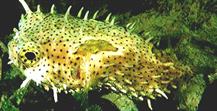
PORCUPINEFISHES - Diodontidae
General:
Although confused by some with Pufferfish (Tetraodontidae [="four teeth"]), Porcupinefish (Diodontidae [="two teeth"]), differ in their beak-like teeth are fully fused, lacking a noticable groove and have obvious spines on the body. Both families have the ability to enlarge themselves as a predator deterrent.
Well-developed sharp spines covering body. Body inflatable, and in some species the spines erect only when the body is inflated.
Jaws with 2 fused teeth (parrotlike). Opposite premaxillaries and dentaries entirely united at midline. Adults found inshore; the young pelagic. Feed primarily on hard-shelled invertebrates crushed by the beak. Eggs are pelagic.
Although confused by some with Pufferfish (Tetraodontidae [="four teeth"]), Porcupinefish (Diodontidae [="two teeth"]), differ in their beak-like teeth are fully fused, lacking a noticable groove and have obvious spines on the body. Both families have the ability to enlarge themselves as a predator deterrent.
Well-developed sharp spines covering body. Body inflatable, and in some species the spines erect only when the body is inflated.
Jaws with 2 fused teeth (parrotlike). Opposite premaxillaries and dentaries entirely united at midline. Adults found inshore; the young pelagic. Feed primarily on hard-shelled invertebrates crushed by the beak. Eggs are pelagic.
Etymology
Greek, di = two + Greek, odous = tooth, teeth.
Greek, di = two + Greek, odous = tooth, teeth.




